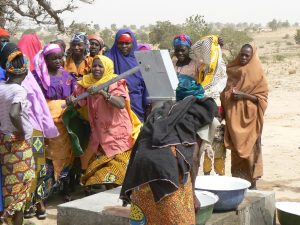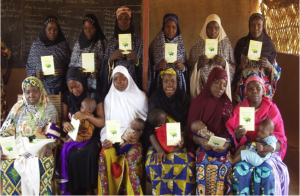By Caroline Moss
Millions of people live in poverty due to the lack of available water resources. In developing nations, the task of retrieving water often falls to women and young girls. In rural Sub-Saharan Africa, women and girls may spend upwards of 3 hours per day, retrieving water that is contaminated and unsafe to drink. Having access to clean water has critical health benefits, but it also affords girls the opportunity to stay in school and women the chance to pursue income-generating work.

Women pumping water from a WBH well.
Wells Bring Hope knows that water is simply the first step. In addition to working with every village for 15 years after a well is drilled, WBH is the only safe water cause to provide microfinance training to women in every village where our wells are drilled.
Microfinance training allows women to make valuable use of the time that is freed up when they no longer have to walk for water. A skilled facilitator assists the women in the village in forming a savings group. She then leads the women in weekly training sessions where they learn basic math and economic skills. This microfinance training a transformative step in the lives of women whose villages have received wells.
When girls no longer have to walk for water, they remain in school. Less than 20% of Nigerien women are literate and only 8% of women attend a secondary school. In addition, families are often forced to decide who to send to school, leaving girls behind while boys pursue their education. Just a year of secondary schooling can account for a 25% increase in a woman’s earnings later in life, and an educated mother is more likely to send her daughters to school, creating an empowered future generation and lasting economic development.

A group of women participating in a savings group.
Wells Bring Hope knows that having easy access to clean water not only saves lives, it gives women and girls freedom. Access to water means that girls are free to pursue their education, and women are free to find income-generating work that helps them provide for their families. When you donate to Wells Bring Hope, you’re not just giving a community life-saving access to clean water, you’re empowering women to transform their own lives.



